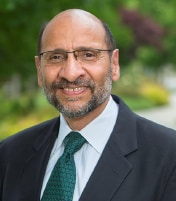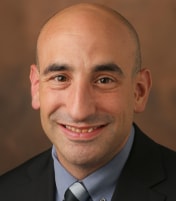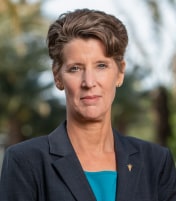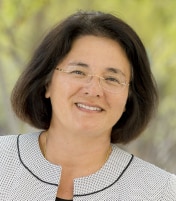At a glance
- The Board of Scientific Counselors (BSC) is an advisory committee to the National Center for Health Statistics.
- BSC members provide advice and guidance on statistical and epidemiological research and activities that focus on various health issues.

Chairman John R. Lumpkin, M.D., M.P.H.

BSC Chair, John R. Lumpkin, M.D., M.P.H., is president of the Blue Cross and Blue Shield of North Carolina Foundation since 2019, and vice president of Drivers of Health Strategy for Blue Cross and Blue Shield of North Carolina.
He also currently serves on the board of directors of the Foundation for Food & Agriculture Research and as chair of Digital Bridge, a multisector forum to collaborate on solutions for a nationally consistent and sustainable approach to using electronic health data for public health.
Most recently, Lumpkin served as senior vice president of programs for the Robert Wood Johnson Foundation (RWJF).
Before joining RWJF in 2003, he served as director of the Illinois Department of Public Health for 12 years. Lumpkin is a member of the National Academy of Medicine and a fellow of the American Academy of Nursing, American College of Emergency Physicians, and the American College of Medical Informatics.
Among his previous leadership positions, he is past chairman of the board of the Robert Wood Johnson University Hospital, and past chairman of the National Committee on Vital and Health Statistics.
His many distinctions and honors include the Arthur McCormack Excellence and Dedication in Public Health Award from the Association of State and Territorial Health Officials, and the Jonas Salk Health Leadership Award.
He earned his M.D. and B.M.S. degrees from Northwestern University Medical School, and his M.P.H. from the University of Illinois School of Public Health.
He was also the first African American person trained in emergency medicine in the country after completing his residency at the University of Chicago.
Term: May 23, 2023–May 31, 2024
Mollyann Brodie, Ph.D.

Mollyann Brodie, Ph.D., is executive vice president and chief operating officer (COO) at the Henry J. Kaiser Family Foundation (KFF) and executive director of KFF's Public Opinion and Survey Research Program.
As COO, Dr. Brodie oversees KFF's budgeting, human resources, facilities management, and executive operations of the President's Office and Board of Trustees.
As executive director, she manages KFF's polling work, including the monthly Health Tracking Poll and ongoing survey partnerships with news media organizations.
A distinguished public opinion scholar, Dr. Brodie's research focuses on understanding the U.S. public's views and knowledge on healthcare policy issues, and the role of opinion in health policy debates.
Her research has been published in the following publications:
- Journal of the American Medical Association
- New England Journal of Medicine
- Journal of Health Politics, Policy, and Law
- Health Affairs
She is co-editor of the book American Public Opinion and Health Care. Dr. Brodie is a former president of the American Association for Public Opinion Research.
She is also the 2018 recipient of the Roper Center's Warren J. Mitofsky Award for Excellence in Public Opinion Research. She received an M.S. in health policy and management and a Ph.D. in health policy from Harvard University.
Term: September 30, 2021–May 31, 2025
Kennon R. Copeland, Ph.D.

Kennon R. Copeland, Ph.D., is a senior fellow in the Statistics and Data Science Department for the National Opinion Research Center (NORC) at the University of Chicago, where he has worked for 14 years.
Copeland has more than 45 years of experience in sample design, weighting methods, and error measurement methods for large-scale household, establishment, and healthcare surveys. Copeland is a fellow of the American Statistical Association.
Copeland began his career with the federal government, first at the U.S. Census Bureau, then at the Bureau of Labor Statistics. For 17 years prior to joining NORC, Copeland was the senior director for statistical services at Intercontinental Medical Systems Health.
Copeland received his Ph.D. from the University of Maryland. He has published articles in various statistical and healthcare journals. He has taught short courses at the Fifth International Conference on Establishment Surveys and the Federal Reserve Board and has presented papers at professional conferences on survey design, methodology, and research topics.
Term: June 1, 2019–November 30, 2023 (extended 180 days)
Tara Das, Ph.D., M.P.H., M.L.I.S.

Tara Das, Ph.D., M.P.H., M.L.I.S., is the state registrar and director of vital statistics at the Texas Department of State Health Services.
She oversees the Texas vital statistics system, including reporting, registration, issuance, preservation, and analysis of birth and death records. She was previously the government information librarian at Columbia University, and the director in the Office of the Registrar of the Bureau of Vital Statistics at the New York City Department of Health and Mental Hygiene.
Dr. Das has a joint Ph.D. in anthropology and political science from the University of Pennsylvania, an M.P.H. in quantitative methods from Harvard University, and an M.L.I.S. in archives and special collections from Pratt Institute.
She received her B.S. in policy analysis from Cornell University.
Term: September 30, 2021–May 31, 2025
Scott H. Holan, Ph.D.

Scott H. Holan, Ph.D., is a statistics professor at the University of Missouri and has a Ph.D. in statistics from Texas A&M University.
His research expertise includes dependent data modeling (spatial, spatio-temporal, functional, and multivariate, among others), Bayesian methods, official statistics, and survey methodology.
Additionally, he has served as a senior research fellow in the Research and Methodology Directorate at the U.S. Census Bureau and in the Office of Survey Methods Research at the Bureau of Labor Statistics.
He is an elected fellow of the American Statistical Association, an elected member of the International Statistical Institute, and an elected fellow of the Institute of Mathematical Statistics.
Dr. Holan was a previous co-awardee of the Statistical Partnerships Among Academe, Industry, and Government Award and is currently co-editor-in-chief of the International Statistical Review.
Term: June 1, 2019–November 30, 2023 (extended 180 days)
V. Joseph Hotz, Ph.D.

V. Joseph Hotz, Ph.D., is the Arts and Sciences Distinguished Professor of Economics and Public Policy at Duke University.
His research includes the economics of the family, economic demography, labor economics, population health, and applied econometrics. His research has been funded by the National Science Foundation, the National Institute of Child Health and Human Development, and the National Institute on Aging.
He is principal investigator of the Add Health Parent Study, a study of intergenerational linkages in health, cognition, and economic well-being between parents and their adult children; and the Great Smoky Mountains Study of Rural Aging, which examines aging at midlife in rural America.
Hotz received his B.A. in economics from the University of Notre Dame and Ph.D. in economics from the University of Wisconsin-Madison. He is an elected fellow of the Econometric Society, Society of Labor Economists, and International Association of Applied Econometrics.
Term: September 29, 2021–May 31, 2025
Bradley Malin, Ph.D.

Bradley Malin, Ph.D., is the vice chair for research affairs in the Department of Biomedical Informatics at Vanderbilt University Medical Center, and the Accenture Professor of Biomedical Informatics, Biostatistics, and Computer Science at Vanderbilt University.
He is the founder and co-director of the Vanderbilt Health Data Science Center, as well as a Center of Excellence in Ethical, Legal, and Social Implications Research.
His research focuses on developing infrastructure to support the collection, analysis, and sharing of biomedical data to comply with organizational and legal requirements.
He has developed numerous methods to perform reidentification risk assessment and deidentification of data drawn from various types of settings, including surveys, electronic medical records, and genome sequencies.
Dr. Malin has received numerous awards, including election to the National Academy of Medicine for his work in biomedical informatics.
Term: December 1, 2020–May 31, 2024
Sally C. Morton, Ph.D.

Sally C. Morton, Ph.D., is a statistician and the executive vice president of Arizona State University's Knowledge Enterprise.
At the University, Dr. Morton advances the University's research priorities and leads its transdisciplinary institutes and initiatives.
Additionally, she drives corporate engagement, economic development, global initiatives, strategic partnerships, and technology transfer.
Dr. Morton has been a leader in both the academy and industry, including as dean of the College of Science at Virginia Tech; as vice president for statistics and epidemiology at RTI International; and as head of the RAND Corporation's Statistics Group. She is a former president of the American Statistical Association.
Dr. Morton is internationally recognized in the use of evidence synthesis in health care. She focuses particularly on patient-centered comparative effectiveness research to help patients, their families, and providers make more-informed health care decisions.
Dr. Morton received a Ph.D. in statistics from Stanford University, where she also earned M.S. and B.S. degrees, and she holds an M.Sc. in statistics from the London School of Economics.
Term: June 1, 2019–November 30, 2023 (extended 180 days)
Lucila Ohno-Machado, M.D., M.B.A., Ph.D.

Lucila Ohno-Machado, M.D., M.B.A., Ph.D., received her medical degree from the University of São Paulo and her doctoral degree in medical information sciences and computer science from Stanford University.
She is associate dean for informatics and technology, and the founding chair of the University of California San Diego (UCSD) Health Department of Biomedical Informatics, where she leads a group of faculties with diverse backgrounds in medicine, nursing, informatics, and computer science.
Also, she is the principal investigator for the California Precision Medicine Consortium for the National Institutes of Health All of Us Research Program. Prior to her current position, she was a faculty member at Brigham and Women's Hospital, Harvard Medical School, and was affiliated with the MIT Division of Health Sciences and Technology.
Dr. Ohno-Machado is an elected member of the American College of Medical Informatics, the American Institute for Medical and Biological Engineering, the American Society for Clinical Investigation, and the National Academy of Medicine. She served as editor-in-chief for the Journal of the American Medical Informatics Association from 2011 to 2018.
She directs the patient-centered Scalable National Network for Effectiveness Research, a large clinical data research network covering more than 30 million patients and 12 health care systems. She was one of the founders of UC-Research eXchange, a clinical data research network that connected the data warehouses of the five University of California medical centers.
She was the director of the National Institutes of Health (N–IH)-funded National Center for Biomedical Computing iDASH (Integrating Data for Analysis, "anonymization," and Sharing), based at UCSD, with collaborators in multiple institutions, as well as other NIH-funded consortia and research projects.
Her research focuses on privacy-preserving distributed analytics for health care and biomedical sciences. She has received numerous awards for innovations in biomedical informatics.
Term: December 1, 2020–May 31, 2024
Andy Peytchev, Ph.D.

Andy Peytchev, Ph.D., is an RTI fellow and a senior survey methodologist. Previously, he was a research assistant professor in the Survey Methodology Program at the University of Michigan.
His recent research includes work on split questionnaire design, multi-frame and multiphase study design, adaptive and responsive survey designs, augmentation of survey samples with external data and evaluation of their properties, improvement of weighting adjustments, and multiple imputation for unit nonresponse and measurement error.
He has lectured on and participated in expert panels to inform the design of major national surveys, including the National Academies of Sciences panel on the Consumer Expenditure Surveys.
He has served as associate editor for Survey Practice and Public Opinion Quarterly, and as Standards Committee chair for the American Association for Public Opinion Research.
He holds an M.S. degree in survey research and methodology from the University of Nebraska and a Ph.D. in survey methodology from the University of Michigan.
Term: May 31, 2023–May 31, 2026
C. Matthew Snipp, Ph.D.

C. Matthew Snipp, Ph.D., is the Burnet C. and Mildred Finley Wohlford Professor of Sociology and the vice provost for Faculty Development, Diversity, and Engagement at Stanford University.
He is a demographer specializing in the racial composition of the United States. Snipp has written extensively about racial inequality, racial measurement, and the demography of American Indian people and other groups.
As a current member of the Committee on National Statistics, he has served on numerous census-related panels for the National Academies of Science, Engineering, and Medicine.
Recently, he has worked on two projects evaluating the quality of the 2020 census: one sponsored by the American Statistical Association and another under the sponsorship of the National Academies.
Term: December 1, 2020–May 31, 2024
Kelly Hoover Thompson, J.D.

Kelly Hoover Thompson, J.D., is a healthcare executive and licensed attorney with more than 20 years of proven leadership in health care, mission-centeredness, and public policy.
She currently leads the government health work at LexisNexis Special Services, where she uses technology, data, and analytics to advance the missions of healthcare partners.
Before joining LexisNexis, Thompson advised private and public sector clients on health information technology, interoperability, policy, and government relations. Previously, she served as CEO of statewide, regional, and community health information exchanges (SHIEC), the national HIE Collaborative.
She has served as regulator and agency head for the Commonwealth of Pennsylvania, as well as a senior advocate for the Hospital Association of Pennsylvania.
Thompson serves as an international leader, advisor and speaker on interoperability and health policy. She volunteers for a variety of national and local healthcare boards and her community.
She is the mother of four amazing children and a true travel baseball and hockey mom at heart.
Term: October 1, 2021–May 31, 2025
David R. Williams, Ph.D.

David R. Williams, Ph.D., is the Norman Professor of Public Health, chair of the Department of Social and Behavioral Sciences at the Chan School of Public Health, and professor of African and African American Studies at Harvard University.
Previously, he served on the faculty of Yale University and the University of Michigan.
The author of over 500 scientific papers, his research has addressed how social factors affect health, and he has developed a strong record of theoretical analysis and empirical research describing the multiple ways in which racism (at structural and interpersonal levels) can adversely affect health.
He is an elected member of the National Academy of Medicine, the American Academy of Arts and Sciences, and the National Academy of Sciences.
He has been ranked as the Most Cited Black Scholar in the Social Sciences, and as one of the World's Most Influential Scientific Minds. His research has been featured in the national print and television media.
Term: October 4, 2021–May 31, 2025
